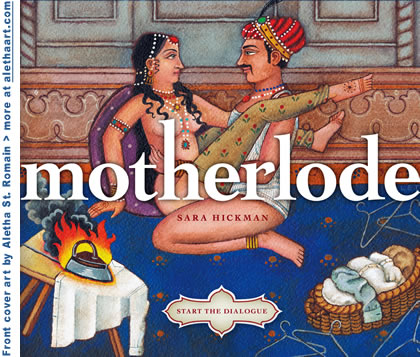
A Conversation with Sara Hickman (continued)
SH: This reminds me of something that happened to me in college. I was painting in this place where I had these dreams. And I realized the dreams were the paintings that were these maps that were to get to this place in these dreams.
PM: Wow.
SH: And my teacher--we would have constructive criticism day. So everybody would put up their art in the class and then all the students would critique it, and the teacher would critique it. And I remember one day I put my art up. And he had said, "I love that idea, it's so creative, and fabulous, go with it." So I put my art up. And he stood in front of the class and he was talking about it. And all of a sudden he said, "Well, the thing about this art is that it's too feminine. It's too much like a woman."
PM: Oh, my God!
SH: And I remember getting very mad and standing up and kind of challenging him in front of the whole class and saying, "Well, excuse me, but I am a woman, and that's how I see it, and that's how I feel it. And I don't think that that should be judged as less than. I don't judge you. I don't look at your art and say, "Well, a man painted that."
I remember that was the first time I--well, not the first time, because I've always been kind of a hothead about that. But I remember being a little nervous because he was a very powerful painter, he's very respected around the world. [laughs] And I was thinking, "Well, I'm going to get an F in this class." But he didn't really say much more after that. I think he got it, that hey, I have the right to be who I am and make art, and your job is to help me make my art better, not to tear my art down because of my gender.
PM: Criticism is so revealing. [You can see a few of Sara's paintings here, in the bio section at her site.]
SH: And it's funny, because this leads into something else. The CD that you have--when people go in stores to buy my CD, the digipak, you can't see her breasts because we got feedback that that would be considered too graphic, and I'd have to put a sticker on that says "parental advisory."
PM: Oh, lord.
SH: And I thought--
PM: Well, what about the front cover?
SH: That's what I mean. So now on the cover, her hair comes down and covers both her nipples.
PM: Oh, I thought you meant the inside lady's breasts.
SH: No, the insides are fine.
PM: I was going to say, come on, give me a break.
SH: No, the digipak is beautiful. But to me it was a bit of a heartache about the cover, because what I loved about it was--to me this wasn't a pornographic cover, even though, yes, these people are in Kama Sutra position, making love, but part of my statement was why can't people talk about sexuality in a beautiful way?

That's how we all got here. And I can't believe it's 2006 and people worry about pedophilia and pornography and yet nobody wants to talk openly about sexuality to compete with pornographic stuff. Because that's why pornography does so well: people feel like they can't talk about it, so they have to go somewhere to get it. It's all this secret taboo stuff.
And it's our job as parents to talk about sexuality at appropriate age levels, but to talk about it without any hint of shame or titillation to it, just be basic about it, and let your children know, yes, this is--"Oh, where did you come from? You came from my uterus, which is part of my vagina, which is inside me. There are these beautiful tubes, the fallopian tubes. And there's an egg. And Dad has seed. And Dad puts the seed with the egg, and that's how you were created. Isn't that wonderful?" "Wow, tell me more." "Okay, I will tell you more."
That's not creating hysteria. That's not making someone feel bad about their body. It's explaining their body to them so that they can make wise decisions on how they want to use their body and share their body. And the fact that this woman's breasts--which was an illustration--that seemed more upsetting to people than the fact that they're having sex, which I--go figure.
PM: Right.
SH: But I thought, man, it's so unfair that men can be on stage and take their shirts off and play music and nobody thinks a thing. But then a woman in the World Cup rips her shirt off at the end, and she's got a sports bra on, for God's sakes, and she's so elated and enthusiastic, and she's doing what men have done at the end of soccer games forever, and she gets this worldwide condemnation for taking her shirt off.
Well, the point is that breasts are these beautiful orbs that women get to have. And they give life, and they're soft and they're wonderful, and everybody wants to touch them. And I don't understand why they aren't revered. Like the painting, this Kama Sutra painting on the cover of my CD, in India it would be considered--
PM: Sacred.
SH: Yes. Sacred and beautiful. It wouldn't be considered dirty, "Ooh! I can see her breasts! Uh-oh!" Or, "Oh, what are they doing?" Which, by the way, I named that position the Motherlode. I don't know what it's really called, but I just decided to call it the Motherlode.
PM: [laughs]
SH: Why is it that in America, which is supposed to be the most contemporary nation on the planet--
PM: Yeah, I thought it was money that you're not allowed to talk about now, not sex.
SH: [laughs] Well, maybe on my next cover I'll put a censored dollar bill.
PM: The Money-lode.
[laughter]
SH: That's good. I love that.
PM: Oh, my. continue
print (pdf) listen to clips puremusic home